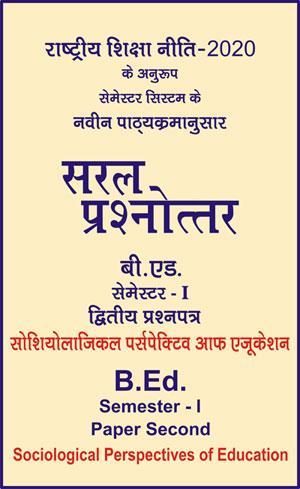|
बी एड - एम एड >> बी.एड. सेमेस्टर-1 प्रश्नपत्र-II - सोशियोलाजिकल पर्सपेक्टिव आफ एजूकेशन बी.एड. सेमेस्टर-1 प्रश्नपत्र-II - सोशियोलाजिकल पर्सपेक्टिव आफ एजूकेशनसरल प्रश्नोत्तर समूह
|
5 पाठक हैं |
|||||||
बी.एड. सेमेस्टर-1 प्रश्नपत्र-II - सोशियोलाजिकल पर्सपेक्टिव आफ एजूकेशन (अंग्रेजी भाषा मे)
Question- Narrate the “Contribution” of National Education Policy, 1986.
Ans.
The above stated policy of education created a sense of new life in the educational structure in India. The undermentioned points can be advanced in support of contribution of this policy.
-
System of Pre-primary education : The commission stated that this period and stage of children is of significance as long as their care, health and development in all respects are concerned. Henceforth, a systematic syllabus is to be introduced for Pre-primary section.
-
Primary education : The students up to 14 years of age need qualitative type of education and as such following pattern was suggested in the scheme of the things.
(i) Child would be considered as the centre of education and he will be imparted with education according to his/her interest.
(ii) As long as the buildings of the schools were concerned, at least two rooms in hygienic condition with a hall should be constructed to provide sound education in rural areas.
(iii) Informal education should be provided to those students who left-out their education in between.
(iv) This kind of education to be provided up to 14 years of age.
- Secondary education : The commission, too, improved the conditions of secondary education and suggested that :
(i) This education develops the sciences of ethics, sociology and development of humanism at large.
(ii) This education contributes a lot and to make the citizens healthy, of moral values, dutiful etc.
(iii) This education stresses on professionalization in the scheme of things.
(iv) Health services were implemented through the syllabus.
(v) Informal education policies were adopted.
-
Higher education system : Higher education develops argumentative-attitudes in the individuals. At this point of time as many as 160 universities and 6000 colleges are providing higher-level education in India. More stress should be on researches in education. The new subjects of Agriculture, Medical Sciences, Technical and Technological studies are to be introduced at higher level of education.
- Elimination of relationship between degree and employment : This policy has eliminated the relationship between degree and employment. This relationship may be existed in such professions where higher education was not necessary. This system will not be applicable in the fields of medical sciences, engineering, laws etc. because higher education in these fields is necessary.
-
Establishment of rural universities : According to this policy, new universities to be established in rural areas and old ones to be re-organized.
-
Education of management and technique : To enhance the status of managerial skills, management process in terms of economy and production has to be re-organized. The management of villages, cities and professions are to be brought under the perview of educational system. Computer education is to be introduced at university level of education.
-
Overhaul of researches and development : The development and researches need overhaul according to existing circumstances and conditions prevailing in the country. So, efforts would be initiated to bring about efficient system at all the levels in the course of researches at all the times. Henceforth, the syllabus of such standards will be reformulated.
-
Formation of new system : The new system, under the scheme of the things, will be evolved to accomplish the remaining tasks of various levels. In this system, the achievements of teachers, students and the educational institutions would be developed at national level.
-
New process of education : The commission was of the view that the faults of the education would be removed and necessary amendments would be brought-about. Lalit Kala, Museum Science, the teaching of Lok Sahitya and researches would be systematized. Human, social, cultural and national values would be developed. It was also stressed that the provisions of 1968 educational policy stand good as long as, existing education is concerned.
-
Evaluation procedure : This procedure needs more authentication and solid attempts to be made to evaluate the achievements of students. The status and achievements of teachers also subject to evaluation. This policy framed certain recommendation in this regard.
-
System of education and means : Amendments in structure at different levels were carried out and means of investments too were determined. The future of education could be not ascertained, however, efforts would be made on spiritual level.
|
|||||














